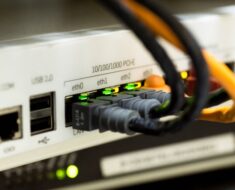Decide which firewall best suits you as per your implementation environment.
The firewall protects our computers from internet hackers.
For Example:
Internet hackers can steal our bank details from our computer and can reduce our bank balance from 1000 dollars to 0 within a second.
So, the firewall is a must in a computer. and in a computer network.
Table of Contents
There are 3 types of firewalls:
- Packet filtering firewall
- Application/proxy firewall
- Hybrid firewall
Before you know what are firewall types, you should know what are data packets.
- When we want to download a file say 200 MB from the internet.
- You will not receive the entire 200 MB data at once.
- But you will receive small packets say 5 MB every second.
- Some of the parts of these 5 MB packets are occupied with information (IP address).
- Such as which sender is sending the data.
- And which computer is receiving the data.
- The remaining file of the packet contains the actual data that you want to download.
- Part of the actual data and some information together form data packets or IP packets.
- The part of actual data is called payload.
Packet filtering firewall
Suppose you are downloading a file from the internet.
- When the data packets arrive a packet filtering firewall.
- It checks only the sender and receiver IP address and the port number present in the data packets.
- There is a rule written in a list called the Access control list that is used for data packets verification.
- If everything is okay then data packets are passed to allow the packet filtering firewall and then to the computer.
What is the port number?
These are some digits written after some IP address represented with a column.
192.168.14.134:80
Advantage of packet filtering firewall
- The packet filtering firewall is available in most internet routers.
- They are the cheapest and the quickest way to implement.
Limitation of packet filtering firewall
- It does not check the data portion ie the payload of the data packets.
- So, the hacker could send malicious data packets in the payload section.
- Packet filtering firewall provides low security.
Application/proxy firewall
Let’s take an example to understand:
- Your Mom told you to buy a pen from the market.
- You went to the shop to buy the pen, come home back and give the pen to your Mom.
- Here you have done the task that your mom wanted you to do.
- Without knowing the shopkeeper knew who actually wanted the pen.
Same in the case of application and proxy firewall.
- Replace the shopkeeper with the Internet and your Mom with a personal computer and yourself with a proxy firewall.
- Like you, you dint let the shopkeeper knew that your mom was the one actually wanted that pen.
- Similarly, proxy firewalls don’t let the internet know which computers actually want to visit the requested data or websites.
- ie proxy firewall hides us from the attacker on the internet.
Let us understand the whole process.
- The user enters www.facebook.com in the web browser.
- Proxy firewall receives the request and forwards the request to the internet.
- The server on the internet receives the request and responds back to the proxy firewall with the information requested.
- The proxy firewall receives the request and forwards it to the original clients.
In this scenario, the proxy firewall is the one who wants to visit www.facebook.com
Advantages of application/Proxy firewall:
- Proxy firewall dint let the webserver know the origin of the request.
- The proxy firewall protects us from potential attackers on the internet.
- This firewall does not disclose our computer identity. ie IP address.
Limitations of application/Proxy firewall:
Since the application/proxy firewall checks the payload of the received data packets so they are much slower than the packet filtering firewalls.
Hybrid firewall
- It is a combination of application proxy firewall and packet filtering firewall in a series to enhance security.
- When the connection is in parallel then the security of the connection is reduced to the parameters found by the packet filtering firewall.
- The application firewall is of no use when connected in parallel.
- In series connection when both firewalls are connected, they provide good security which in terms called a hybrid firewall.
Implementation of firewall
Packet filtering firewall: Used in a low-risk environment such as small enterprises, shops, schools, etc.
Application/proxy firewall: Used in a medium-risk environment such as medium enterprises, offices, universities, etc.
Hybrid firewall: Used where need more security such as IT sectors, data centers, etc.






